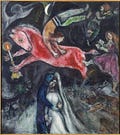Morning and Evening, Pt. XI
The eleventh installment in an ongoing narrative, told week by week
Previously: Morning and Evening, Parts I, II, III, IV, V, VI, VII, VIII, IX and X
Edited by David Swanson
By the time Yossel returned from heder at noon—the eve of a holiday meant a short day of study, leaving time for the necessary ablutions and prayers—the mare and foal were gone from the pasture, the barn door shut and sealed. The stench of death, sharp and repulsive, rose from the gaps in the boarded windows.
As Yossel ascended the hill from the farmer's house the hoarse neighing of the foal still echoed in his ears. The way it pawed at the frozen earth, the crazed fear in its red-rimmed eyes—these images were printed in blazing colors on his eyelids. Death had come to it on the day of its birth; Yossel felt this injustice keenly. This foal had had no time to sin. From the moment it set its hooves on the cold ground, it had felt terrible fear, hunger and illness plagued it from its first breath. On which day of His creation did God foreordain the death of innocents? And if He had pushed the soft muzzle from the teat, if He beckoned the cruel winds towards the thin trunk of the new creature, what explanation could He then give for His cruelties?
Surely the lives of men and beasts were as brief flashes of light, or even less, to the mind of a being older than time and the earth itself; but if that was true—and the foal with its black blaze, its liquid eyes, were beneath His attentions—why, then, had He created His laws, which governed Yossel's life to the minute of prayer and the smallest drop of milk, should it happen to fall in a pot of meat stew? For all his few years Yossel had lived in fear of God's wrath, which leveled cities, which burnt the sons of Aaron from the nostrils inward, should he stray from the letter of the law—which filled heavy tomes with its instructions.
But beasts were beneath this governance; being incapable of thought or speech, they could not sin. Yet anyhow they might die in great pain and before their time. If this was true, then what system of reward and punishment could account for it? Nothing was outside God's power, yet the elements of nature were surely outside the bounds of His notions of good and evil; only man was given the Torah, only the mind of man could comprehend its mysteries. And yet what was behind the anguished cries of the foal but pain and fear, what was in the heart of the mare that ceaselessly sought to arouse its hunger and still its agitation but love and sorrow? And what could pain and sorrow be but punishment?
Keep reading with a 7-day free trial
Subscribe to The Sword and the Sandwich to keep reading this post and get 7 days of free access to the full post archives.




